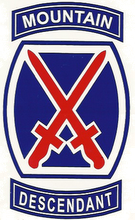We captured the villa of Mussolini. By Eugene S. Hames
We captured the villa of Mussolini
It was late April 1945- the 10th Mountain Division was acing northward along the east shore of Lake Garda in northern Italy. The Division had fought valiantly in the Apennines during the winter months and spearheaded the Allied breakthrough to and across the Po River.
I was the platoon leader of the First Platoon of Company K of the 85th Regiment.The Platoon had experienced the heavy fighting on Mount Belvedere and in the vicinity of Castel d'Aiano in the Apennines.
On reaching the Po Valley, we had been assigned to Task Force Duff, a special unit that was created to reach the Po River as soon as possible. We were transported by trucks as we proceeded northtoward the Po River. Shortly afte rthe task force was formed and was moving northward, the front units were fired up on and our platoon was ordered to detruck and wipe out the resistance. The rest of the task force by passed the resistance. The fighting was intense but brief - two Germans were killed, several wounded and manys urrendered. The Platoon suffered no casualties thatd ay. We continued to take prisoners, many of whom walked in and gave up. When we finally turned the prisoners into the MP's later that day, we had 360 Germans - not a bad day's work for approximately 40 ski troopers. Since we did not have a truck it took us 2 days to catch up with K-Co. The Division had already crossed the Po River by that time. The Division captured Verona and swung westward and proceeded northtoward BrennerPass.
As the Division was advancing northward along the east shore of Lake Garda, lead battalions from the three regiments changed almost from day to day. One night, when the 3rd Battalion of the 85th was the lead battalion, we walked in a light rain along the lake and we walked so late at night that Inearly fell asleep while Iwas walking. The Germans were fleeing north on the west side of the lake and resistance was very slight. We finally held up for the night in some arge buildings along the road. The next morning I was ordered to the Battalion C.P. to be briefed or a special mission. Iwas told by BN.S - that I was to take a motor boat and ten men from my platoon and we were to cross Lake Garda that afternoon. Our mission was to capture and occupy a villa where Mussolini had been living toward the end of the war. He had setup a puppet government in northern Italy after the Italians had surrendered.
The previous day we had observed, through field glasses some German vehicles proceeding north on the west shore of the lake. We saw some whiteish-looking structures that appeared to be some unusual type of fortification. The shoreline on the westside was mountainous and in some places the terrain rose abruptly for hundreds of feet above the lake shore. There were also a number of tunnels through which the road on the west side of the lake passed as it proceeded north toward Riva, a small town on the north end of the lake.
Since I knew the Germans were retreating north on the west shore, I had a great deal of concern about crossing the lake during day light hours. In a small boat we would be a sitting duck. I returned to the platoon area and advised the troopers of the mission. We were to take a number of automatic weapons with us so we would have considerable fire power as we crossed the lake. I asked for "volunteers", and we were in the process of deciding which ten men would go and what fire power we would take when a jeep drove up. A full Colonel was seated in the front in the passenger seat; an officer I had never seen before. When Isaw the"chicken" on his shoulder and 10th Mountain patch,I went over to the jeep and saluted him. He asked me what we were doing and after I explained to him what my mission was, he said "I on't like this, Lieutenant". I said " I don't either, Sir", and he then cancelled the mission. Later, I learned I had been talking to Colonel Darby, the famous ranger who had joined the 10th Mountain Divisionas Assistant Division Commander after General Duff had been wounded in the Po Valley. Darby changed the orders and a special task force consisting of all of K Company and some additional platoons was created with orders tocross the lake at night in order to occupy the villa and the town of Gargnano. We were supplied with large amphibious Duks to make the crossing. Our Platoon was assigned to the first Duk as we crossed the lake. At the appointed time, approximately 1:30 a.m. on April 30,1945, the Duks arrived and we prepared to load for the trip across the lake. The Duks were extremel ynoisy - I'm sure they could be heard all the way across the lake so obviously any surprise was out of the question. I recall thinking that what we were about to do was comparable to going pheasant hunting while riding on a Ford tractor.
After contacting the driver of the Duk and while we were getting everyone loaded, we discovered that the Duk had a .5Ocaliber machine-gun mounted above but near where the driver sat. No one in the platoon had ever fired a .50 caliber machine-gun except myself. My only experience was at OCS at FortBenning, Georgia, where we had fired .50 caliber machine-guns at sleeves or targets that were towed by plane. While we crossed the lake, I manned the machine-gun and was standing near the driver and just to the left ofw here he sat. I felt exposed and would have preferred to have been down in the Duk as we went across.
It was a fairly dark night and we were all quiet as we headed across the lake and neared the west shore. The other Duks were behind usin a staggered formation; we could hear all of them even thought we couldn’t see some of them. Our plan was to land north of Gargnano and then move south and occupy the villa. As our Duk pulled into the shore on the westside, we wanted to unload quickly so the other Duks could come in. We did not know until we started up the bank toward the road that there were some terraces several feet high that had to be negotiated as we moved away and up from the lake. The trip over had been uneventful, not a shot was fired-but I felt that if the Germans were going to shell us they would obviously concentrate on the landing area where the Duks were trying to unload. I urged the men to move-up the terraces and at one point I got rather frustrated when they wouldn't move.I recall cursing at a couple of replacements who didn't seem to want to leave the landing area. After proceeding over several terraces, we finally reached the road and moved to our left toward Gargnano. Although it was dark, an old Italian man on a bicycle approached us (he was lucky he didn't get shot) and we ascertained from him that all of the Germans had left the town earlier that morning. True to what he told us, ween countered no Germans as we approached the village and occupied the villa. Other troops from K Company went on into the town of Gargnano and occupied the villages quare and other government buildings in the town. There was a winding steeproad that came down into Gargnano from the mountain in a series of switchbacks. I took several riflemen and amachine-gun and we walked up several switchbacks to a point considerably higher than the main part of town. We setup a roadblock at that point to protect the town from any Germans that tried to enter from that avenue. Next morning we also discovered that the "unusual fortifications", were concrete supports for lemon trees. The up right portion of the structure was concrete with wooden supports between them to hold up the fruit.
We found that the villa was a very unique two story building and bore considerable evidence that Mussolini had been living there. One room was filled with medicine and pills and looked like a pharmacy. It bore silent testimony to the fact that Mussolini had been a very ill man toward the end of the war. There was a large kitchen and on the second floor a number of bedrooms. I promptly took over a large bedroom (which I assume was the bedroom used by Benito) for platoon headquarters. I believe that every man in the platoon had a bed to sleep in and it was great to have facilities to cook some food such as fish,vegetables and eggs. At a loading dock in front of the villa a beautiful inboard boat had been destroyed and sunk. In a garage behind the villa two large black limousines were also ruined by placing phosphorous grenades on the motors of each. There was also a bomb shelte rwith cemented walls which was dugin to the bank behind the villa.
I have never been able to determine exactly when Mussolini left the villa, but one article I read stated he left the area on April 19 and first went toMilan. He was killed on May 2,1945. We had occupiedt hevilla on April30,1945.
The war ended for us in Italy on May2,1945. We were still living in the villa and continued to stay there for about a week before we we removed to Cividale,a small Italian village north of Udine, for occupational duty.
In 1985, forty years later, I returned to Gargnano looking for Mussolini's "castle” as we called it. The villa, which was and is now·known as The Villa Feltrinelli, is not only still there, but it has been repainted and the upper structure has been slightly changed. It is a beautiful, unique structure and is located on one of the largest of the Lombardy lakes in northern Italy. We were not able to drive down to the villa from the highway due to some large metal gates that blocked both roadways. The gates were equipped with huge padlocks and there were several "nopermission” signs one ach gate. The villa was unoccupied. On checking at the village square, we located a friendly baldheaded Italian, who looked a great deal like Mussolini. He had an extremely small motor boat and agreed to take two of us out into the lake and we went past the villa so we were able to take some photos of it from the lake. Forty years later the villa still had a certain mystique and bought a flood of memories of what had occurred years earlier.
After we visited the villa, I located a card shop in Gargnano and purchased some postcards of the villa. While I was there, I also obtained an original photograph of Mussolini. The photograph shows Benito riding on an old bicycle in the grounds of the villa in 1944. He was dressed in an army uniform in the picture and appears to be quite thin. Since we did not capture him, we have to be content with the realization that we did capture and occupy his last residence. We have some small items such as epaulets from his uniforms, which are sufficient to remind us of what took place over 50years ago. This is a story that is not well-known and perhaps ha not been published earlier, but I feel that it should be told. The First Platoon was proud to have made some real contribution toward shortening the war in the Italian Theatre. We will always remember the night we crossed the lake and occupied the villa. We are thankful that Colonel Darby, who was killed the day before the war ended, cancelled our daylight mission and delayed the crossing until after dark. Iwill always bein debted to him as I believe he saved our lives by cancelling the planned daylight excursion across Lake Garda.
January 26, 1998
1st Lieutenant - Co.K - 85
Eugene S. Hames








